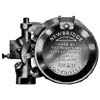
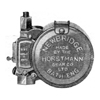
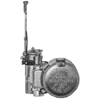
|
newbridge gas controller
The most popular Controller extant for use in ordinary "square" gas lanterns (upright and square lanterns).
Quick lighting and extinguishing. Heavy guage rustproofed steel case. Extinguishing pilot
to oder. Instantly detachable and guaranteed interchangable insect proof clockwork
movement. Hinged cover.
Can be fitted with a variety of ignition devices including the "Equinox" (with byepass) and "Comet" (no byepass).
Used for upright lamps i.e. square lamps. The Primer version permits the passage, for a few minutes prior to full "ON", of sufficient gas to
expel any accumulation of air in the supply pipe between the controller and the burners. First Coment ignitors appear in
in mid 1935. (The catalogue number is changed to 3A/UNI/COM if Comet fitted). Fitted with a 15 day clock movement
which can be extended to a 35/42 day run if required.
Comet Mark III first announced in early 1937 for the Newbridge 3A/UNI Controller, designed for
square lanterns, fitted with an easily detached battery holder, and obviates the need of byepass ignition -
this was designed to meet the demand for a lower priced
type and is easier to fit to an upright type lamp. The
battery is contained in a chromium plated cylinder attached
to the Bakelite base of the Comet body. (Second and third illustration shows a 3A/UNI controller with Mark III
Comet igniter).
In 1938, the 3A/UNI Controller
fitted with the Mark III Comet represents the last word in automatic control. Mark III Comet ignition device mentioned
along with Mark VI and Mark VII in 1945. By 1946, the Mark IX Comet was available, as being advertised with
the 3A/UNI Controller. The Comet has been improved and is now
rendered free of electrical tracking and the shortened battery facilitates the changing of batteries
in square lanterns. By the use of Comet ignitors, the need for a by-pass is eliminated,
and saves an average annual saving of up to 1,500 cu. ft. of gas per lamp.
|
|
Newbridge 3A/UNI
|
Gas Controller
|
15 day run
|
1932 Catalogue
1933 Advert
1936 Advert
1936 Advert
1936 Advert
1937 Advert
1937 Advert
1937 Advert
1937 Advert
1937 Advert
1938 Advert
1938 Journal
1938 Advert
1938 Advert
1938 Programme
1939 Journal
1939 Advert
1939 Advert
1939 Programme
Public Lighting #36
1945 Programme
1946 Advert
1947 Advert
1947 Journal
Public Lighting #80
Public Lighting #84
Public Lighting #86
Public Lighting #90
|
|
Newbridge 3A/UNI/Checking
|
Gas Controller
|
15 day run
|
1947 Journal
|
|
Newbridge 3A/UNI/Primer
|
Gas Controller
|
15 day run
|
1937 Programme
|
|
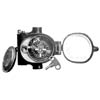
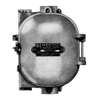
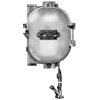
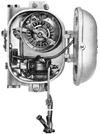
|
Newbridge Gas Controller
Being marketed in 1933, but also described as introduced in 1936 (this must've been
the redesign in a different case). Has a 15 day run.
Initially for vertical or descending supply. Has one gas way. Only 5½in. overall. Clockwork
movement. Instantly detachable. Quick lighting and extinguishing. Cast Iron
(aluminium to order weatherproof outer case). Models are available for special
purposed such as midnight reduction, main tap control up to 2 in. iron,
solar compensation of times of lighting and extinguishing etc.
Subsequently used for suspension type lamps and contains the clockwork movement, main valve,
"Comet" and battery in a
weatherproof case. (This was probably the version introduced in 1936).
Used for suspension lamps as before the Comet Ignitor
could only be used with upright square lamps. This is for the many authorities who prefer to
use Controllers fitted immediately above the Lamp. Second illustration shows the gas controller
with the comet igniter.
By 1938, the Mark III Comet was being used for square lanterns
and the Type 15/3A/COM Controller (which embodied the
Controller and Comet in a weatherproof case) was being used for suspension
and globe lamps. Handset or solar dials can be supplied.
The Comet entirely eliminated permanent by-passes, and when the gas is turned on to the burners, the
Comet automatically gives a flame of about 5 seconds dwell, which is sufficient to ignite the burners. Saves
approximately 2000 cu. ft. of gas per lamp per annum.
|
|
Newbridge 15/3A
|
Gas Controller
|
?? day run
|
1933 Advert
1945 Programme
|
|
Newbridge 15/3A/COM
|
Gas Controller
|
?? day run
|
1936 Journal
1937 Advert
1937 Advert
1937 Advert
1937 Advert
1938 Journal
1938 Advert
1938 Journal
1938 Advert
1938 Advert
1938 Programme
1939 Advert
1939 Advert
1939 Advert
1939 Programme
1945 Programme
1947 Journal
|
|
Newbridge 15/3A/COM/VER
|
Gas Controller
|
?? day run
|
1939 Programme
|
|
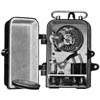
|
Electrical Time Switch
Designed for group street lighting control and will deal with
loads of the full rated capacity continuosly without fear of breakdown.
Very simple in construction and designed for low maintenance cost.
Capacity of 15A D.C. at 250V and 30A A.C. at 250V. Later quoted (in 1937) to
a capacity of 50A A.C. at 250V. Single or double pole. 15 or 35/42 day run, hand wound or
electrically wound.
|
|
E/2
|
Electrical Time Switch.
|
|
1933 Advert
1937 Advert
1938 Advert
|
|
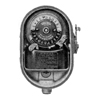
|
Electrical Time Switch
Compact unit. Can switch 10A. A.C. or 5A D.C., at 250 volts, single pole. Can be fitted with Handset Dial
or Solar Compensating Dial. 15 day, 21 day run or 40 day run, hand-wound clockwork movement.
Complete in cast iron weatherproof case. By 1938, was being called the "Type T" (the postfix being
the D.C. amperage). Singe pole, double break, quick action metal contact type switchgear. With extended drum. Suitable
for mounting in base of lamp columns.
|
|
T/5
|
Electrical Time Switch
|
15-21 day run
|
1936 Advert
1938 Advert
1936 Advert
1947 Journal
|
|
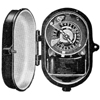
|
Electrical Time Switch
Single pole time switch for unit street lighting control. 5A AC
or DC at 250V. This type of time switch is available with either
cast aluminium or cast iron weatherproof case. Available in various types e.g. 15 day hand wound model, 250 volts, 5 amps at
A.C. or D.C.; synchronous motor driven, 250 volts, 5 amps, A. C. only. A general utility model. Single pole, double air
break, metal-to-metal contact type switchgear.
|
|
U/4
|
Electrical Time Switch
|
|
1937 Advert
1945 Programme
1947 Journal
|
|
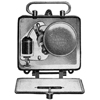
|
Electrical Time Switch
Single pole time switch for group street lighting control.
20A AC (10A DC) at 250V. This type of time switch is available with
either cast aluminium or cast iron weatherproof case.
|
|
E/5
|
Electrical Time Switch
|
|
1937 Advert
1945 Programme
|
|
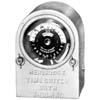
|
|
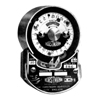
|
|
|
|
|
|
|
gas controller
This controller, complete in weatherproof box, is designed for use with dual supply suspension lamps. It has an interesting
modification - instead of the normal single gas way, this controller has two. Thus in conjunction with a three tappet hand set dial,
gas may be cut off from a predetermined number of burners in the cluster at midnight. The remaing burners are then extinguished at some
later time by the third tappet.
|
|
15/4/3A
|
Gas Controller
|
|
1947 Journal
|
|

|
|
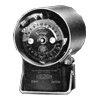
|
Electrical Time Switch
This is the synchronous motor driven model with spring reserve of three days. Can be modified with extra tappet
to switch off at midnight and turn on again in the early morning.
|
|
V/SRS
|
Electrical Time Switch
|
|
Public Lighting #99
|
|
|
|
Electrical Time Switch
Drives circuits of up to 20A, 250V at 50Hz.
|
|
Y Mark II
|
Electrical Time Switch
|
|
Public Lighting #104
|
|



